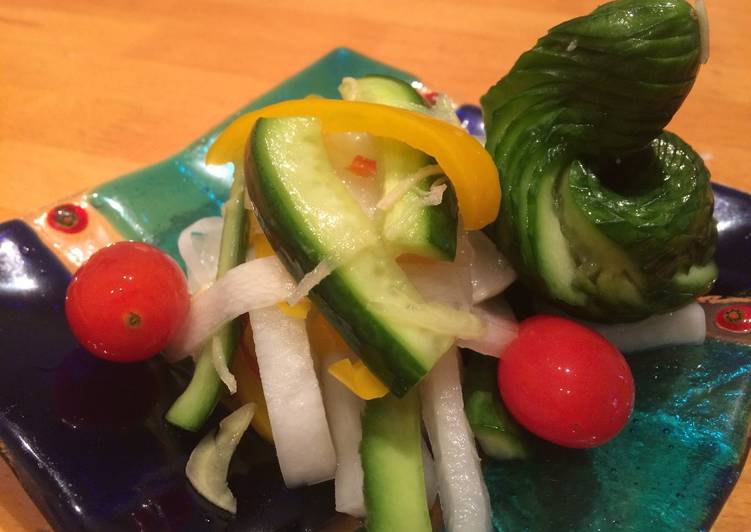
Hello everybody, it is Jim, welcome to my recipe site. Today, I’m gonna show you how to make a distinctive dish, sweet pickled vegetables japanese style. It is one of my favorites. For mine, I’m gonna make it a bit unique. This will be really delicious.
Sweet pickled vegetables Japanese style is one of the most favored of current trending foods in the world. It’s simple, it is quick, it tastes delicious. It’s appreciated by millions daily. Sweet pickled vegetables Japanese style is something which I have loved my entire life. They are nice and they look fantastic.
#vegan#vegetable#cooking Please use your favorites vegetables and enjoy sweet pickled vegetables. I made capellini with left over pickled and it was amazing. Pickled Vegetables - Tsukemono Tsukemono, or Japanese pickled vegetables are a trademark snack or rice accompaniment found in all Japanese Japanese Style Pickled Vegetables.
To begin with this recipe, we have to first prepare a few ingredients. You can have sweet pickled vegetables japanese style using 13 ingredients and 6 steps. Here is how you cook it.
The ingredients needed to make Sweet pickled vegetables Japanese style:
- Take 5 Cucumber
- Take 100 g Carrots
- Get 200 g Bell pepper
- Get 300 g Daikon radish
- Make ready 30 g Ginger
- Get 2 Chili pepper
- Make ready (seasoned)
- Get 500 cc Water
- Take 50 g Salt
- Prepare (Pickling sauce)
- Get 1 L Water
- Prepare 500 g Sugar
- Prepare 200 cc Vinegar
Japanese pickle usually contains cucumber, carrot, celery, and red chilies. This little dish of tart and salty pickles (tsukemono: pronounced soo-keh-MOH-noh in Japanese) is served Daikon is a large white Asian radish with a crisp, juicy texture and slightly sweet flavor. Japanese-Style Pickled Vegetables. this link is to an external site that may or may not. Turn your summer vegetables into delicious Japanese pickles with these classic recipes!
Instructions to make Sweet pickled vegetables Japanese style:
- Cut vegetables with bite size pieces. Peel and shred ginger, take seeds out and slice round chili pepper
- Place all the vegetables except ginger and chili pepper in a bowl with seasoned liquid to take out extra liquid from vegetables, 2 hours later drain them in a strainer, wash them lightly under running water to take out an extra salt and drain again
- Boil 1L of water and 500g sugar (2:1 ratio) in a pot, let it cool and add vinegar, this is a sauce for pickles
- Mix well drained vegetables, ginger and chili pepper and pour pickling sauce, leave it in a fridge. It can be eaten from next day to 5 days
- If tomatoes are used, prick them so they can be picked well. I made capellini with left over pickles and it was delicious.
- My cooking video are available on YouTube, you can search "Coozy Life" if you like I would love you to have "Subscribe" and "Thumbs Up". Your supports will encourage me to make more interesting recipes in the future.
From pickled ginger, quick pickled cucumber to pickled Known as tsukemono (漬物), Japanese pickles are palatable, crunchy and brimming with a sweet-tart flavor. Serve the pickled vegetables with a sprinkling of sesame seeds and serve immediately. Store any leftovers in the fridge, in the vinegar mixture, for up. Pickled Vegetables - Tsukemono Tsukemono, or Japanese pickled vegetables are a trademark snack or rice accompaniment found in all Japanese household. These quick pickled Asian vegetables are truly awesome, all you do is make the liquid, chop up vegetables - I used carrots, cucumbers, red There's nothing more satisfying than making quick pickled Asian vegetables…unless it's opening the refrigerator and enjoying some of the pickled.
So that is going to wrap this up for this exceptional food sweet pickled vegetables japanese style recipe. Thanks so much for reading. I’m confident you can make this at home. There is gonna be interesting food in home recipes coming up. Remember to save this page in your browser, and share it to your family, colleague and friends. Thanks again for reading. Go on get cooking!

